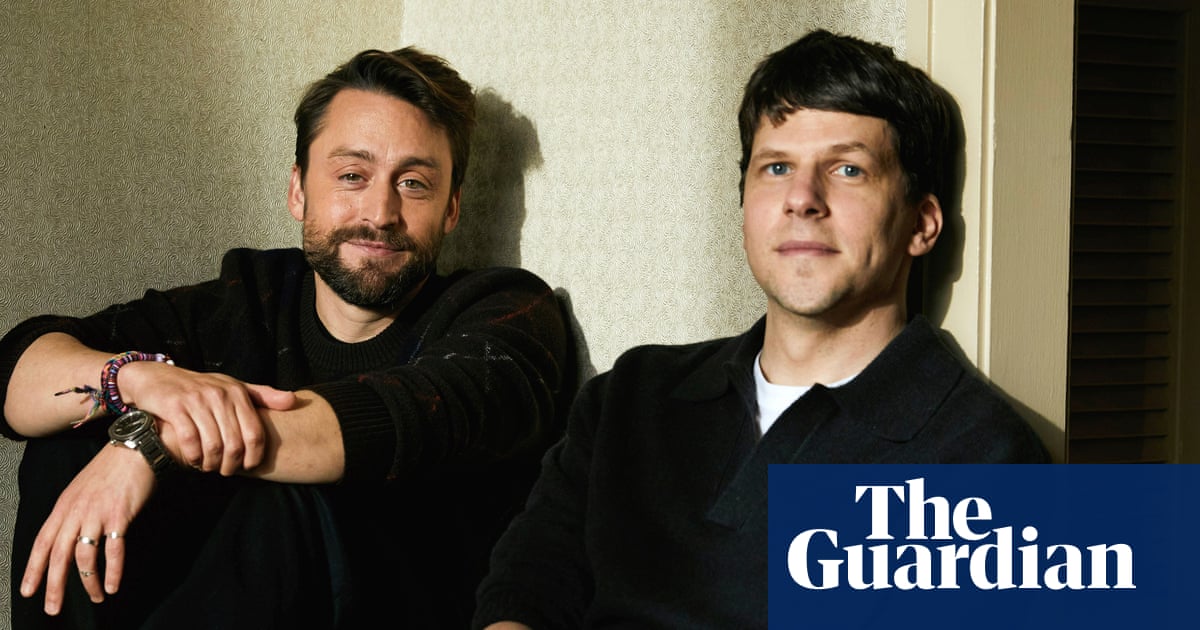As the conversation turns to their own experience of pain and struggles, Eisenberg and Culkin both express different perspectives on sharing personal struggles. Eisenberg, despite dealing with OCD and anxiety, chooses to keep his pain private, feeling that it is unexceptional and not worth burdening others with. On the other hand, Culkin questions the idea of self-love and whether it is healthy to completely embrace oneself without any sense of shame or humility.
Despite their differing views on self-disclosure and self-love, both actors find themselves delving into personal pain in their latest film, “A Real Pain.” Eisenberg, who wrote and directed the film, explains that his exploration of his family’s history was a way to find meaning in his own life. The film, set against the backdrop of a trip to Poland to explore Jewish heritage, features themes of pain, struggle, and self-discovery.
As they discuss the making of the film and their personal connections to the story, Eisenberg reflects on the influence of his great-aunt Doris, who passed away at the age of 106. He credits her blunt honesty and tough love for pushing him to strive for greatness in his work and personal life.
Both Eisenberg and Culkin have found personal growth through the process of making the film, with Eisenberg even becoming a Polish citizen. Their shared experiences on set and promoting the film have brought them closer together, despite their initial differences. Culkin’s dedication to his family and Eisenberg’s appreciation for his role as a father both shine through in their interactions and work on the film.
As they continue to navigate their personal struggles and relationships, Eisenberg and Culkin find common ground in their shared experiences and mutual respect for each other’s journey. Their collaboration on “A Real Pain” not only explores themes of pain and self-discovery but also showcases the power of connection and understanding in the face of adversity.
It is clear from this excerpt that the actors involved in the film “A Real Pain” take their roles and the subject matter very seriously. They discuss the importance of portraying the harrowing history of the Holocaust with sensitivity and authenticity. The actors, including Jesse Eisenberg, Macaulay Culkin, Jennifer Grey, and Will Sharpe, share their personal experiences and insights into the emotional impact of filming such intense scenes.
Eisenberg and Culkin discuss how having children has changed their perspective on the world and how they prioritize their children over their own vanity. Grey speaks about her family’s Jewish heritage and the resilience of the Jewish people throughout history. Sharpe reflects on the overwhelming emotional experience of visiting a concentration camp and the difficulty of comprehending the enormity of the Holocaust.
The actors and director of “A Real Pain” are conscious of not wanting to sensationalize or exploit the tragedy of the Holocaust for the sake of entertainment. They strive to create a film that is respectful and thought-provoking, while also acknowledging the complexities and challenges of depicting such a traumatic historical event. Escribiendo el guion, estudiaría tales folletos y muchos tenían frases como: “Terminamos lo suficientemente temprano para disfrutar de una cena agradable en el centro de Cracovia.”
“Si quieres que la gente venga y reviva esta historia desgarradora, no puedes llevarlos en un vagón de ganado y tirarlos al suelo. Tal vez haya alguna forma visceral de hacerlo donde caminas llevando electrodos que se activan mientras recorres el campo, pero ni siquiera eso se acercaría a la experiencia de ser prisionero en una guerra.”
Lo que habría sorprendido a Doris, piensa él, es cómo los vecinos polacos que defraudaron a su familia están ahora defendiendo su posición. “Entre los judíos de Nueva York hay un verdadero resentimiento hacia los polacos. Lo escuché mientras crecía: ‘¡Ah, los polacos son antisemitas!’ Yo tuve la experiencia exactamente opuesta. La gente hablaba sobre la historia de mi familia con más reverencia de la que escuchaba en casa. Pasan sus días conmemorando la historia de las familias de otras personas de una manera mucho más apasionada y esforzada que cualquier cosa que haga yo.
“Jóvenes académicos [en el museo de Majdanek] pasan todos los días en una oficina que está fuera de la entrada a uno de los lugares más horribles de la Tierra. Y pasan su tiempo tratando de obtener más información sobre su historia para que puedan hacer su museo aún más preciso.”
Eisenberg admira a Ayoade y Nemes, pero son estas personas a las que venera. Ha sido parte de la industria cinematográfica desde que era pequeño, pero ha estado rodeado de maestros y activistas durante más tiempo: sus padres y su esposa (a quien conoció en 2001) y su familia.
Cerca del final de la película, uno de los intentos de David y Benji de rendir homenaje a los muertos pone en peligro a los vivos. ¿Con qué frecuencia juzgamos mal el duelo? “Pienso en el dolor todo el tiempo”, dice, “por razones que no quiero divulgar. ¿Cuándo es apropiado? ¿Cómo presentamos el duelo al mundo, cuándo es egoísta y cuándo es útil?”
¿Y tiene una respuesta? La economía se abandona brevemente. “No, por supuesto que no. No, no, por supuesto que no. Por supuesto que no. No.”
Un Verdadero Dolor ahora está en estreno.
